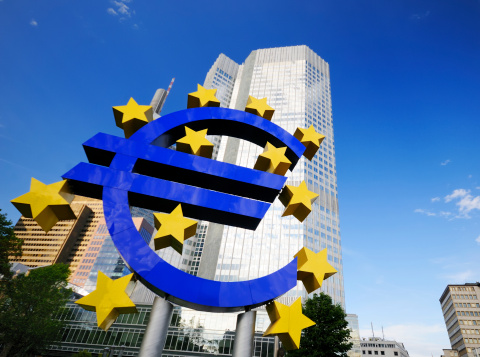Banking, finance, and taxes
European Central Bank Considers Negative Deposit Rates
Published:
The European Central Bank (ECB) is considering even more easing than the official rate cut we saw recently. Now there is talk that easing could be taken as far as creating negative rates. Bloomberg reported that the ECB is considering a negative interest rate on deposits. This is unheard of, and of course it is atrocious news for the value of the euro currency against any other major currency.
Effectively, this forces money into the system because it acts almost exactly like a tax on idle money. We would caution that the report is according to people familiar with the matter and not based on any live commentary from central bankers in Europe.
If accurate, this would be a 10 basis point cut under the 0.00% rate. The euro currency fell to less than $1.35 on the news. Even the Vanguard FTSE Europe ETF (NYSEMKT: VGK) fell on the news report. This exchange traded fund is similar to the S&P 500 in the United States: it tracks the FTSE Developed Europe Index, which is made up of roughly 497 common stocks located in 17 nations throughout Europe.
What is interesting is that U.S. equities fell simultaneously. You would think that the markets love any form of stimulus that they can get, hence quantitative easing galore. Maybe the markets have just had it with all the additional stimulus measures and have determined that it is finally time to fly alone without so much government nudging.
By cutting bank deposit rates to below zero, this incentivizes banks to lend money at positive rates rather than to pay a penalty for hoarding cash. Effectively, it acts exactly the same as a tax on capital, and that is a scary precedent.
Start by taking a quick retirement quiz from SmartAsset that will match you with up to 3 financial advisors that serve your area and beyond in 5 minutes, or less.
Each advisor has been vetted by SmartAsset and is held to a fiduciary standard to act in your best interests.
Here’s how it works:
1. Answer SmartAsset advisor match quiz
2. Review your pre-screened matches at your leisure. Check out the advisors’ profiles.
3. Speak with advisors at no cost to you. Have an introductory call on the phone or introduction in person and choose whom to work with in the future
Thank you for reading! Have some feedback for us?
Contact the 24/7 Wall St. editorial team.